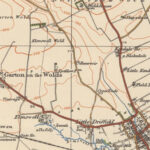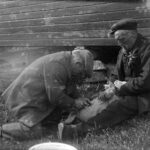3 May 1641: On the day of the discovery of the True Cross, Driffield folk start moving their livestock out of town to high summer pasture, endangering crops
Henry Best. 1857. Rural Economy in Yorkshire, in 1641. Ed. Charles Best Robinson. Durham: Surtees Society. Get it:
.Unedited excerpt
If an excerpt is used in the book, it will be shorter, edited and, where applicable, translated.
Our townesfolkes (most commonly) just on St. Hellen-day, beinge the 3d of May, beginne to teather theire draught cattle, viz.; theire horses and theire oxen, abroad; in the field, on the heads, common balkes, bounders of fields, and theire owne lande endes, togeather with the towne, towne side, and the like; as for such heads and balkes as part two fields, and are bounders betwixt two severall lordshipps, they are common to both, and the one towne hath as much interest and right to teather on them, and on such places I have knowne poore folkes beginne to teather theire kyne the 20th of Aprill. Aboute St. Hellenmasse, when our townesfolkes beginne to teather theire cattle abroade, our cheife care is to save our corne, our owne lande-endes, and our fresh pitts; and if wee doubt eyther theire teatheringe, or theire turninge loose on nights, but to rise before day bee light, and sometimes att midnight, otherwise one shall neaver meete with them; the course which wee take to prevent them from puttinge theire cattle into the Spellowe on nights, is, to gette it well fenced a little before May day, and then cuttinge a longe thicke stake, wee knocke it downe soe close to the gate, and leave it soe high above grownd, that the gate cannot possibly bee lifted over; and this is not stirred till such time as wee sende our waines to fetch away the hey.
See more of this subjeckt in the beginninge of the first booke before the desc[ription] of lands appertaininge to each farme.
FOR TAKINGE OF GATES OR GEASTES FOR BEASTES.
Aboute a weeke afore St. Hellen day, wee beginne to inquire and listen after gates for our younge beasts; if wee heare of none to our minde, then on May-day, the day after, or perhapps a day or two before, wee sende our foreman, or some other, to take as many as wee stande neede of att some such place wheare wee knowe theire beast pasture to bee good, and wheare they may have water to come to; when wee take gates for our younge beasts, wee hire usually for all our yeeringes, all our two yeare old beasts, and but seldome for our three yeare old beasts, unlesse wee bee very full stocked att hoame; such beasts as are thus taken into any pasture to bee kept, are (hereaboutes) called geasters, i. e. gesters, and theire gates soe many severall jeastes; they sende them usually on St. Hellen day or the day afore, and they are to continue, and to have theire pasturinge theire, till Michaellmasse; wee had the last yeare seaven beasts at Sledgmour, which wee had noe leisure to fetch hoame, and they sente them not till Powder treason day, the 5th of November. Yeeringes are accounted but halfe gates on the Greetes. and pay but halfe the rate that kyne and the other older beasts pay; but on the wolds they are all alike: Kellithorpe Greets was wonte to bee a pasture that younge beasts would like very well on (and all by reason of the water soe neare at hande,) till nowe of late it was overstocked with sheepe. Wee have hyred beast gates at Rastrope, and att Thistendale, for 2s. a geast ; these two townes are not halfe a mile asunder, and aboute seaven miles from this place; they are beyond Burdall-dayles,b and the way to them is by Frydaythorpe, or Fimmer: one may allsoe take gates att Frydaythorpe, but theire pasture will hunger our beasts that are used to better keepinge; one may allsoe take gates att Huggate, which is oftentimes very good pasture; wee have taken gates att Cottam for 2s. 6d. a gate; one of Greate Driffield sente (this yeare) three beasts to Sledgmour the morrowe after St. Hellen day, whoe sayd that hee payed 88. for three gates, i. e. 28. 8d. a peece. Wee tooke gates att West-Lutton, in the year 1639, for 38. 4d. a gate, and our beasts weare allmost fatte att Michaellmasse when they came hoame; wee sente Lawrence Middleton thither againe to take gates for eleaven younge beasts this 2nd of May, and they would not take under 48. a gate, and wee must pay noutheard-wages, and sesses, and layes; the noutheard wages weare (for every beast) 2d. for theire wontinge pennies when they wente, 2d. att Lammas, and 2d. a peece at Michaelmasse when they weare fetched away: and the sesses and layes would have come to other 6d. a peece, which was (in all) 58.; and for 68. 8d. a peece, wee could have had them wheare they might have beene fedde. Wee sent our foreman againe to Thissendale on Fryday the 6th of May, and there they asked 48. 8d. a gate, and would not take under 4s.; besides all theire gates weare letten but two, whearefore wee putte them to the Greets. Salvyn her gates on the Greets are allwayes att a rate, viz.; 58. 4d. a cowe-geast; her nowtheards wage is 208. in money, the milke of a cowe, and a cowe-geast; besides hee hath allsoe the mucke on the cowe-hill, wheare the beasts lye on noones, which hee can lette for 4d. a weeke: shee letteth the mucke of the cowe holde to poore folkes for 8d. a weeke: the beasts are most of them sente in on St. Hellen day, and the day after, some perhapps not of a weeke after; the nowt heard hath for every beast one pennie, which is called a wontinge penny; hee taketh them all in himselfe, and perhaps keepeth them a weeke till they bee wonted and hanted togeather, and after that setteth a boy or girle to tente them. Mrs. Salvyn hath raysed her halfe gates from eight groates to three shillinges: soe soone as our foreman came from Thissendale and had dined, wee sente him to her to take geasts for eleaven, whearof seaven weare yeeringes, and fower, two yeare olde; the yearinges weare large, and the two yeares little, soe that there was little difference in theire bignesse, soe that they wente all for halfe gates, beinge that they coulde not bee discerned: besides, if they bee not full two yeare olde they are called but yeeringes: wee seldome sende money till wee fetch them away: besides, on the Greets, poore folkes putte on theire kyne, and seldome speake to her for them to knowe what they shall pay till theire time be expired, beinge that they knowe her usuall rate; wee sente our foreman and two boyes with them that night, beinge Fryday the 6th of May, they had each of them an horse.
Comment
Comment
Did local people comment on the coincidence between this transhumance of sheep (amongst others) and the transport of the Lamb of God to Golgotha (a hill in Christian tradition), or to paradise between his crucifixion and resurrection (Luke 23:42-43)? “Wold” turns up again and again in this connection, here in a late 13th century passion poem, regarding the temptation of Christ:
Þe holy gost hyne ledde. vp in-to þe wolde.
For to beon yuonded. of sathanas þen olde.
Þer he wes fourty dawes. al wiþ-vte mete
(Morris 1872)
This othur nyght soo cold
Hereby apon a wolde
Scheppardis wachyng there fold,
In the nyght soo far
To them aperid a star.
(Anon 1902)
Transhumance in the Yorkshire Dales
My fleeting impression is that longer-distance transhumance (still short of the great Spanish migrations) was conducted before the Dissolution by the great religious orders. Here (via John McDonnel (McDonnel 1988)) in 1598 the herder Richard Knowles (80) recalls moving flocks between Fountains Abbey and Fountains Fell (Malham) before the Dissolution 60 years previously:
Richard Knowles of Wessitt Houses in the parish of Kirkby Malloughdale, aged 80, confirmed from knowledge ever since he could remember the sheep, cattle [kyne], mares, and nags of Fornah Gill House did pasture in common together with the goods of the Abbey before and at the dissolution thereof of his sight, who served one of the Abbey’s herds seven years before the dissolution and at the very time thereof, and helped to fetch the Abbey’s goods at Fountains Abbey yearly about St. Ellen Day [May 21] to Fornah Gill and helped also to drive them back again to Fountains Abbey about Michaelmas [September 29] yearly (Purvis 1949).
Ra. Buck’s testimony re the lack of security before the Dissolution is remarkable:
Being born very near to the same grounds and dwelling there the same time, and so knew the premises to be true and did know the herders that kept the same grounds and goods therein for the Abbey, and hath seen the herders milk the Abbey’s kyne in the same ground, lying there swords and bucklers besides them whilst they were milking. (op. cit.)
Would someone like to reconstruct Richard Knowles’ route? Pateley Bridge, but then? I can’t locate “Wessitt” Houses, but Fornah Gill barn (at least) is 54.121813,-2.236811.
Also, can someone summarise the plant & animal biology behind the dates?
Did transhumance here and/or in general cease with the Dissolution?
Kyne -> cattle, though elsewhere kyne and other cattle suggests cows.
St Helen/Ellen/Helena’ Mass: transhumance day
St. Ellen is St. Helen, popular in the north (e.g. the holy wells). St Helen’s Mass, the day on which transhumance tended to being, was the commemoration on May 3rd of the Invention of the Holy Cross, the True Cross having been found by St Helena on her travels – see e.g. here and here. I previously wrongly thought her feast was May 21st:
Feeling stupid – St Ellen? (Transhumance in the Pennines between Kirkby Malhamdale & Fountains Abbey) pic.twitter.com/8PQQnkXuL3
— Singing Organ-Grinder (@elorganillero) May 10, 2023
Something to say? Get in touch
Similar
 22 November 1641: Snow falls at Elmswell (Driffield), and sheep farmers jostle for low ground and feed
22 November 1641: Snow falls at Elmswell (Driffield), and sheep farmers jostle for low ground and feed
Comment
Comment
I think the red willow is Salix x rubra – red osier – rather than fragilis.
Something to say? Get in touch
Search
Donate
Music & books
Place-People-Play: Childcare (and the Kazookestra) on the Headingley/Weetwood borders next to Meanwood Park.
Music from and about Yorkshire by Leeds's Singing Organ-Grinder.



 Bluesky
Bluesky Extwitter
Extwitter